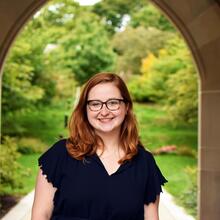A Reflection for Monday of the Third Week of Easter
Find today’s readings here.
“This is the work of God, that you believe in the one he sent.” (John 6:29)
I don’t speak Greek.
After almost three years of working on these daily Scripture reflections, though, learning to read Koine Greek, the dialect in which the New Testament was originally recorded, sits high on my bucket list. It’s thanks to the scholars who, with their grasp of the language’s nuances, have helped me along the way; they’ve offered something new to consider in readings I’ve encountered many times before—in a translated English version.
One of the first things I do when I am assigned one of these reflections, after reading through the day’s selections on my own and having a first reaction, is consult our office’s copies of Sacra Pagina, several volumes of New Testament commentary written by a team of Scripture scholars and edited by Daniel Harrington, S.J. Their pages have lit up Scripture for me many times over, providing both interpretive analysis and line-by-line notes on historical context and translation.
When I read the notes for today’s passage from the Gospel of John, one point about the meaning of the original Greek made me sit up straight.
To the crowd that has gathered to observe him and ask him questions about how to do God’s work, Jesus offers a stirring line: “This is the work of God, that you believe in the one he sent.”
Here’s what Sacra Pagina has to say about the line.
That you believe in him: The present subjunctive pisteuēte (“believe”) has a durative meaning. The believing must go on.
It’s one thing to say yes, I believe this is Jesus Christ. Yes, I believe he is God. Yes, I see evidence of his miraculous deeds in this world. It’s another thing entirely to deepen that belief—and to sustain it for a lifetime.
How did the people who originally transcribed these New Testament stories make meaning, in their own language, of what the things they had seen were asking of them—and, down the long and winding road, of us? The work of detailed translation gives 21st-century Scripture readers a clue.
Thanks to commentators who read the Greek that I can’t, in my prayer I am turning over this idea of durative belief, belief that goes on. In the immediate aftermath of seeing a miracle, believing is easy. After time spent trudging back into the seemingly miraculous work of daily life, our feelings of closeness to God can fade.
Our church is currently in a moment of wandering. We are treading water without a leader, and we’re mourning one who modeled Christ’s way for many of us, Catholics and non-Catholics alike. I don’t know about you, but for me mourning Pope Francis and looking ahead to the conclave has turned my attention back to my faith. This time is difficult, painful even, but it’s the kind of time that collapses the distance between me and other Catholics, even between me and God. It makes us feel closer and more connected. Our belief, our identity—they heat up in a moment like this when the whole world is watching.
But will what we feel now be durative? Will it last?
Let us pray that the church’s new leader, the one we may welcome very shortly, represents and engenders this kind of lasting faith. Under his leadership, may the church be the place where the distance between us and God feels a bit smaller.







